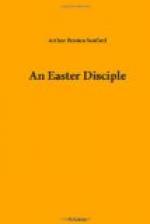That lithesome, cultivated, serious-minded young knight, Quintus Cornelius Benignus, is standing on the height which overlooks the great metropolis. He is the son of Marcus Cornelius Magnus, that Roman noble who is the intimate associate of the reigning Caesar, and who has been a luxurious resident on the Palatine Hill since his distinguished proconsulship in Africa.
* * * * *
Note.—It is not from any time-marked Hebrew roll that this story of Quintus is now taken. He was of Roman blood, and his record is, rather, to be found in the Latin literature of his time. Well it is when some new leaf is discovered among the musty folios, reciting the saintly character and the triumphs of those who lived when Christianity was new. This record shows the worth of consecrated life and service in the days when the luxurious Roman state most needed a Christian citizenship. But the lesson is none the less for these last days, when the hope of the world is in the creed of Quintus.
* * * * *
By the side of Quintus is his fellow soldier Aulus. They had spent their boyhood together among the scenes of Rome; now they are companions still, on this last Roman expedition to the district of Judaea. While the common soldiery are throwing their dice in the camp thoroughfare, these are speaking of more serious things. The picture on which they look from lofty Scopus includes the shining roofs of Jerusalem, the wooded Mount of Olives, and the far landscape to the south and west; its undulations and brilliant colorings no Roman artist might put upon the canvas.
With the autumn haze covering the extended panorama, Quintus says first to his comrade:
“What the fates have in store for me, here in the city of Hierosolyma, I am much wondering. The day before our trireme sailed from Brundisium for Tyrus I made a visit to the augur’s tent. His prediction was that my journey hither would be followed by strange consequences. The flight of the birds through the air did not reveal to him just what was to occur; but that something eventful was to take place he was very sure. What is to be my fortune?”
“Your lot it may be,” answers Aulus, “to perform some daring deed, here in our Jewish campaign; and on your return to Rome you may receive a great reward from the hand of Tiberius.”
“In my mind this has been,” replies Quintus; “before I left Rome I had an audience with our divine Caesar, and he was pleased to say that my fidelity here might bring me special recompense. Yet would that be satisfying? I have seen the triumphal processions in the streets of Rome, when heroes have been acclaimed; I have heard our statesmen in the Senate hall, and prize the joys of oratory; I have been served all my days by slaves in my father’s palace, and know the sweetness of the Falernian wine in the banquet room. A proconsulate, if I might come to that dignity, would be a high honor to write in my life story. But, my dear Aulus, would there be content in this? My restless soul seems crying out for some better gift from the gods.”




